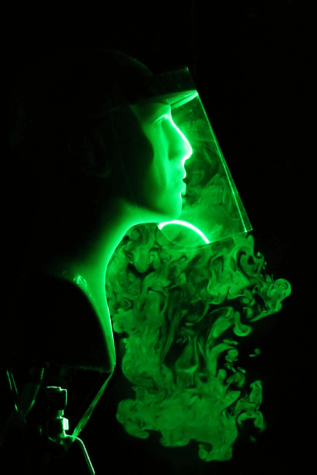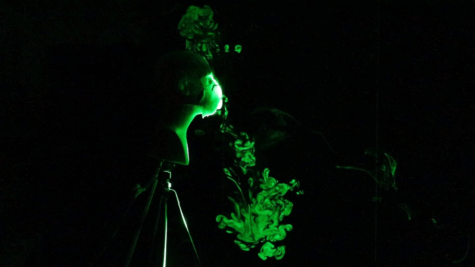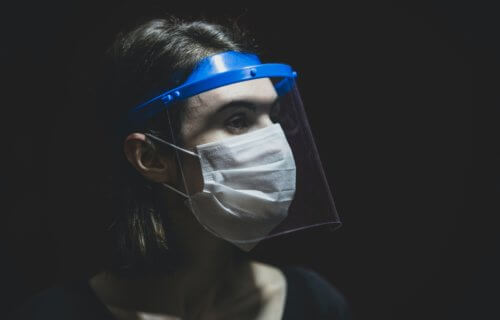BOCA RATON, Fla. — In a quest for comfort, some are finding alternatives to using face masks during the coronavirus pandemic. From bandanas to clear face shields, the options can be numerous, but are these face coverings really protecting people? A study by Florida Atlantic University is literally shedding new light on the issue. Researchers reveal using face shields and face masks containing exhalation valves alone are not stopping the spread of COVID-19. These options are still releasing potentially infectious clouds into the air with every breath.

Researchers with FAU’s College of Engineering and Computer Science used a laser light show to back up the Centers for Disease Control and Prevention’s guidelines, discouraging the notion these coverings alone provide adequate protection. Researchers, using a laser light sheet inside their lab, show how droplets easily move around a plastic face shield when patients cough or sneeze.
The flow visualization study also captures the path of these aerosols (tiny droplets) as they spread across a large room. Equally concerning, researchers find face masks with valves also ejects unfiltered droplets back into the air. Even the widely popular N95 versions of these masks expel clouds of aerosols when users cough and sneeze.
“We were able to observe that face shields are able to block the initial forward motion of the exhaled jet, however, aerosolized droplets expelled with the jet are able to move around the visor with relative ease,” study co-author Manhar Dhanak explains in a university release.
A concerning flaw in face masks with valves?
While it’s clear to see where germs can escape from open face shields, the new revelations about valved masks may be confusing to some. High-quality face masks, especially the N95 respirator, remain in high demand during the pandemic. The issue, FAU researchers say, surrounds models with one or two exhale ports on either side of the covering.

The laser light sheet reveals a small gap at the top of the mask and nose bridge where aerosols escape. The valve however, is the bigger concern. While these popular masks clean the air coming in, the air people breathe out is not.
“Masks with exhalation ports include a one-way valve which restricts airflow when breathing in, but allows free outflow of air. The inhaled air gets filtered through the mask material, but the exhaled breath passes through the valve unfiltered,” study co-author Siddhartha Verma explains.
“There is an increasing trend of people substituting regular cloth or surgical masks with clear plastic face shields as well as using masks that are equipped with exhalation valves. A driving factor for this increased adoption is better comfort compared to regular masks.”
Which mask should you use?
Study authors say their tests reveal the popular or comfortable choices for face masks aren’t necessarily helping to protect others. They advise using a plain, high-quality cloth or surgical mask without valves. The study warns that switching to alternative face coverings may actually hinder the ongoing progress in stopping COVID-19’s spread.
“The research conducted by professors Dhanak and Verma on the importance of proper face coverings to stop the spread of COVID-19 has literally illuminated the world,” Stella Batalama, dean of FAU’s College of Engineering and Computer Science adds.
“This latest research provides important evidence to further support CDC guidelines and inform the public to make better selections in their choice for face coverings for their benefit and for public safety.”
The study appears in the journal Physics of Fluids.
Like studies? Follow us on Facebook!

This infrmation is so extreamly missleading it is worthless. Where is the data for all of the mask users that do not bend the wire around the nose? Is clearly says that the wearer of a mask with a one-way valve is protected. IE it will prevent the virus from infecting them. Which is stopping the spread. The first line of defense is to not breath it in by wearig a mask. The second line of defence is social distancing. At that point to say that you are spreading it by wearing a mask with a check valve is to assume that you already screwed up the first two defenses. It doesn’t have a logical following. Then if you did have it, not exhale the virus is to keep it in your system, that is not a good thing. Possibly a death sentence. After catching it the infected person would want to expel the virons from their body so that they recover sooner. If everybody else is correctly wearing a mask and social distancing then those with a one-way valves are completely moot. I seriously doubt that anyone who caught the virus and is irresponsible enough to go out and about is compentent enough to correctly wear any mask. Any time a mask is leaking at the nose it is a mask that is not being worn correctly. Why would they study a mask that is not correctly worn/donned/fitted. Not wearing a mask correctly is a far bigger problem that renders every mask worthless.
Instead of telling us what won’t work, tell us what will. As it is now, I’m going to have to give up my N95 mask with a vent that protects me to be surrounded by people wearing masks that protect no one. Everyone should be responsible for protecting themselves . Why bother wearing anything if it protects no one.